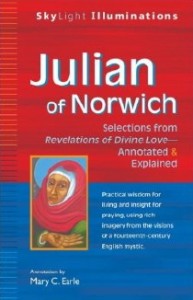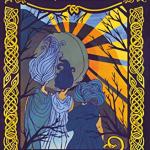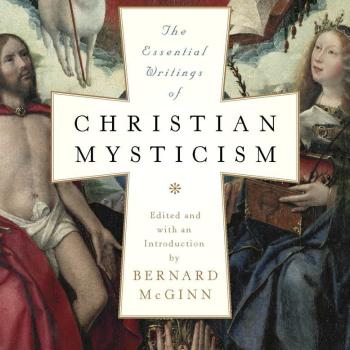 I’m not sure why the fall of 2013 belonged to Julian of Norwich (except to the extent that any time is a good time for reading and reflecting on Julian’s wisdom). What I do know is that three wonderful books about Julian were published that fall.
I’m not sure why the fall of 2013 belonged to Julian of Norwich (except to the extent that any time is a good time for reading and reflecting on Julian’s wisdom). What I do know is that three wonderful books about Julian were published that fall.
If you’re already a Julian nut (yes, that’s a pun) like me, rejoice, for these are all worthy books to add to your library. If you have not yet discovered Julian — the medieval anchoress (solitary) who experienced a series of vivid mystical visions and then wrote the first book in the English language by a woman, a text which shimmers with optimistic spiritual insight — any one of these books would be an excellent entry point.
What’s wonderful about Julian is that she never goes out of style. So these books may be a few years old — but they are still worth reading, and would make great holiday gifts as well.
The Showings of Julian of Norwich
First up is a new translation of Julian’s long text, The Showings of Julian of Norwich: A New Translation (Hampton Roads) by Mirabai Starr. If you’re not familiar with Mirabai Starr, you need to be; she has already penned luminous translations of works by John of the Cross and Teresa of Avila (read my review of Starr’s translation of St. Teresa’s The Book of My Life here) as well as a lovely book about interspirituality called God of Love.
Because she approaches the mystics primarily from an interspiritual perspective, Starr brings a fresh perspective to her translation, and tries to avoid using language that has become overfreighted with baggage (thus, she often translates “sin” as “to miss the mark,” which actually is a fairly accurate representation of the connotation of the Greek and Hebrew words for sin.
Granted, not everyone will agree with her decision to replace Julian’s “those who will be saved” with the more inclusive “all beings,” but given that Julian wrestled with the problem of traditional church teaching about judgment and damnation, I think the case can be made that this is what Julian truly meant. If nothing else, at least Starr is honest about all the ways in which she paraphrased Julian’s words in her preface to the actual text.
 But what a lovely translation it is. Starr brings a kind of earthy simplicity to her rendering of Julian’s words, making this sort of the Julian equivalent to The Message. In other words, this version finds a sweet spot between readability and accessibility, while remaining faithful to the poetic, and love-infused, lyricism of the original text.
But what a lovely translation it is. Starr brings a kind of earthy simplicity to her rendering of Julian’s words, making this sort of the Julian equivalent to The Message. In other words, this version finds a sweet spot between readability and accessibility, while remaining faithful to the poetic, and love-infused, lyricism of the original text.
Selections from Julian, Annotated and Explained
For readers who may want a more concise introduction to Julian’s wisdom, with annotations to amplify the meaning, Mary C. Earle’s Julian of Norwich: Selections from Revelations of Divine Love—Annotated & Explained (Skylight Paths) offers an insightful overview of the anchoress’s main themes. It’s part of the “Skylight Illuminations” series from Skylight Paths Publishers, a series of a variety of sacred texts and mystical writings from the world’s great traditions, arranged with selections from the text on one page and annotations on the facing page.
It’s a user-friendly way to read an annotated text, and since it only consists of selections, which are arranged topically, it’s a great overview of Julian’s thought. Chapter topics include “Images of God,” “Our Relationship to God,” “Prayer and Faith,” and of course, the two points for which Julian is most renowned: “The Motherhood of God” and “All Shall Be Well.” Earle’s commentary is insightful but not overly academic, making this a superb overview of this mystic’s thought.
Julian’s Gospel
 Finally, the most in-depth exploration of the anchoress’s work comes from Veronica Mary Rolf’s Julian’s Gospel: Illuminating the Life & Revelations of Julian of Norwich (Orbis Books). At over six hundred pages, this is quite the tome! It’s a detailed study not only of Julian, but of the world in which she lived. The first part of the book considers what Barbara Tuchman called “the calamitous fourteenth century,” providing insight into the city of Norwich of Julian’s time, and some of the key characteristics of the age: the plague, the politics and conflicts that shaped both England and the church of her day, as well as the domestic realities of medieval marriage and family life.
Finally, the most in-depth exploration of the anchoress’s work comes from Veronica Mary Rolf’s Julian’s Gospel: Illuminating the Life & Revelations of Julian of Norwich (Orbis Books). At over six hundred pages, this is quite the tome! It’s a detailed study not only of Julian, but of the world in which she lived. The first part of the book considers what Barbara Tuchman called “the calamitous fourteenth century,” providing insight into the city of Norwich of Julian’s time, and some of the key characteristics of the age: the plague, the politics and conflicts that shaped both England and the church of her day, as well as the domestic realities of medieval marriage and family life.
Against this backdrop, Rolf provides a detailed commentary, with an exciting new approach to translating Julian’s own words: by keeping a number of Julian’s most commonly used words in their middle English form, Rolf creates a sort of hybrid text that is more accessible to the twenty-first century eye, but still retains a flavor of Julian’s original voice. If your goal is to eventually read Julian in the middle English, Julian’s Gospel can function as a sort of gateway to that project, introducing the reader more gently to both the beauty and the strangeness of the English language of Julian’s day.
Part of what makes Rolf’s perspective unique is her background in the theater (she is a playwright, actor, and drama teacher), so she considers Julian’s wisdom from a theatrical perspective, with a fascinating chapter on how the medieval mystery plays no doubt formed part of Julian’s education in theology. When she notes that in one of the passion plays performed in Norwich in Julian’s lifetime, Pontius Pilate (!) says “All shall be well,” I was electrified.
Does this prove that Julian saw that play, and quoted it in her own writing? Of course not. But Rolf goes on to note that other writers like Walter Hilton used a similar phrase, concluding that it may have been a popular saying of time, sort of like “It’s all good” is heard colloquially in our day. Tidbits like this make Julian come alive, more real and human than merely reading her own words could ever do.
Last May marked the 640th anniversary of Julian’s visions. If these three wonderful new editions of Julian’s writing and commentaries on her work can be published in a year like ours, can you imagine the treasures that will come out in ten years, to mark her 650th anniversary? Delicious as that may be to ponder, it’s best to enjoy the present — and these three books give us plenty to savor.
Disclosure: a complimentary review copy of each book reviewed in this post was supplied to me by the publisher. If you follow the link of a book mentioned in this post and purchase it or other products from Amazon.com, I receive a small commission from Amazon. Thank you for doing so — it is the easiest way you can support this blog.
Enjoy reading this blog?
Click here to become a patron.














